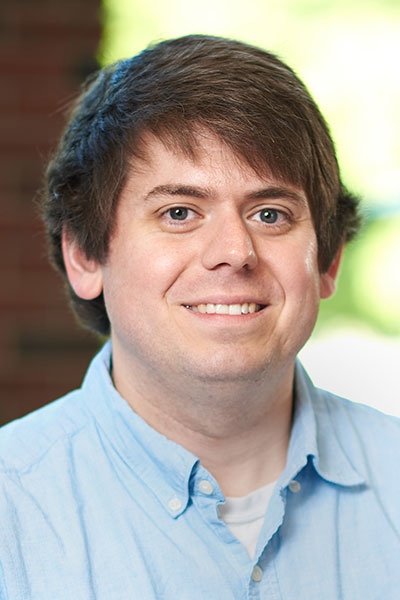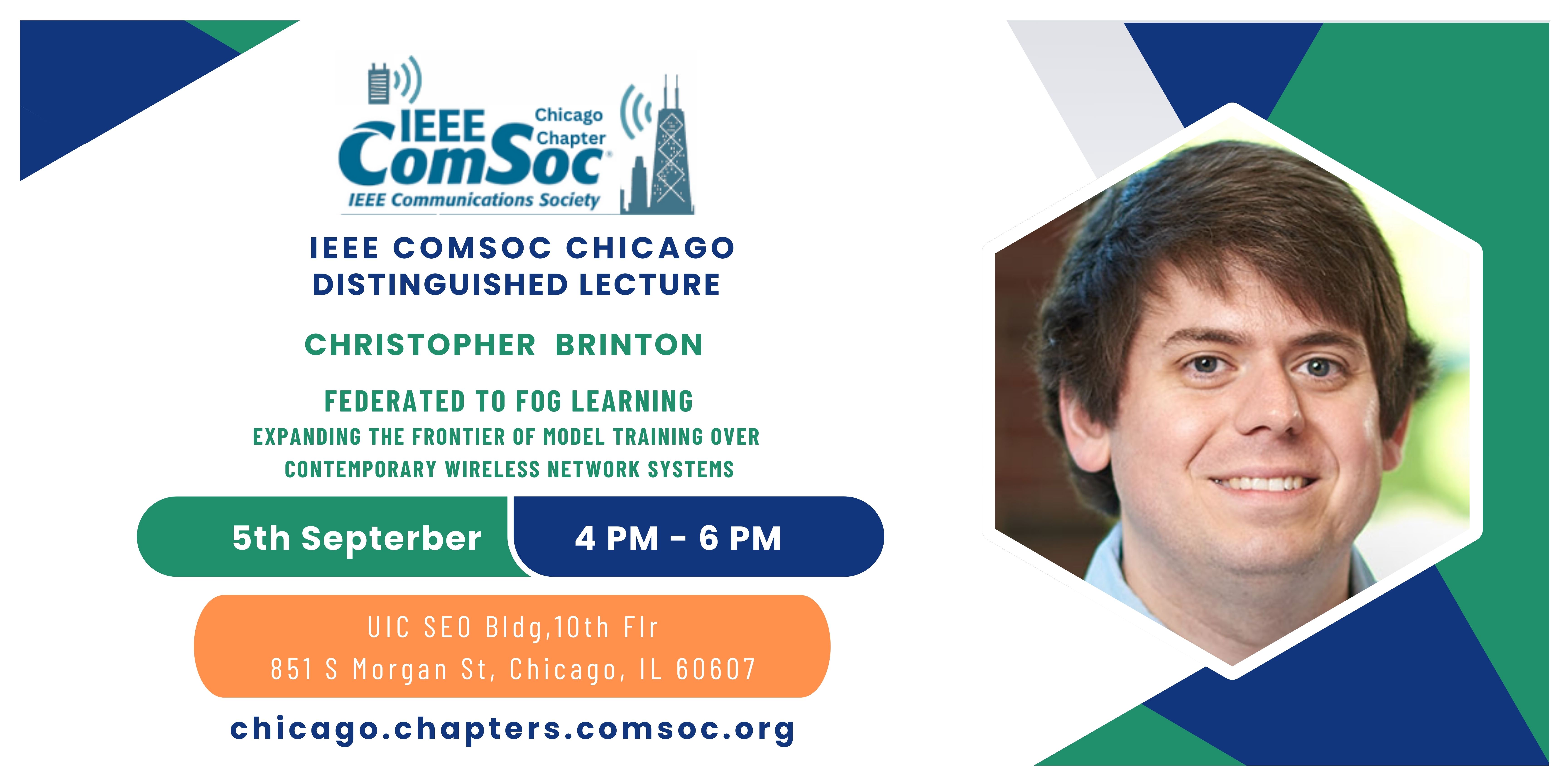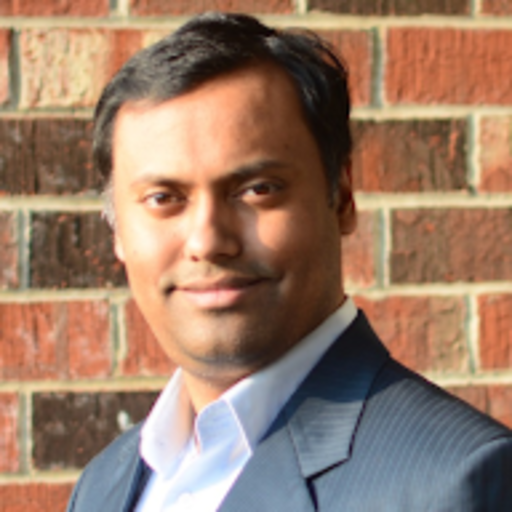COMSOC Chicago chapter Distinguished Lecture
Chicago COMSOC Chapter is delighted to be back with the Distinguished Lecture series. Under the leadership of Prof. Besma Smida , IEEE COMSOC North America Director, COMSOC Chicago chapter is pleased to host 3rd IEEE COMSOC Distinguished Lecture Series.
Topic: From Federated to Fog Learning: Expanding the Frontier of Model Training over Contemporary Wireless Network Systems
Abstract
Fog learning is an emerging paradigm for optimizing the orchestration of artificial intelligence services over contemporary network systems. Different from existing distributed techniques such as federated learning, fog learning emphasizes intrinsically in its design the unique node, network, and data properties encountered in today’s fog networks that span computing elements from the edge to the cloud. An important thread of research in fog learning has been on understanding the role that peer-to-peer topologies formed on an ad-hoc basis among local groups of heterogeneous computing elements can play in elevating the achievable tradeoff between intelligence quality and resource efficiency. In this talk, I will discuss recent results on the analysis of fog learning processes which give insights into the impact that these topologies, along with other properties such as model characteristics and fog decision parameters, have on global training performance. Additionally, I will discuss the development of adaptive control methodologies that leverage such relationships for jointly optimizing relevant fog learning metrics.
Date and Time
Location
Hosts
Registration
-
 Add Event to Calendar
Add Event to Calendar
- 851 S Morgan St
- Chicago, Illinois
- United States 60607
- Building: Science and Engineering Office
- Room Number: 1000
- Click here for Map
Speakers
Chris of Purdue University
From Federated to Fog Learning: Expanding the Frontier of Model Training over Contemporary Wireless Network Systems
Fog learning is an emerging paradigm for optimizing the orchestration of artificial intelligence services over contemporary network systems. Different from existing distributed techniques such as federated learning, fog learning emphasizes intrinsically in its design the unique node, network, and data properties encountered in today’s fog networks that span computing elements from the edge to the cloud. An important thread of research in fog learning has been on understanding the role that peer-to-peer topologies formed on an ad-hoc basis among local groups of heterogeneous computing elements can play in elevating the achievable tradeoff between intelligence quality and resource efficiency. In this talk, I will discuss recent results on the analysis of fog learning processes which give insights into the impact that these topologies, along with other properties such as model characteristics and fog decision parameters, have on global training performance. Additionally, I will discuss the development of adaptive control methodologies that leverage such relationships for jointly optimizing relevant fog learning metrics.
Biography:

Fog learning is an emerging paradigm for optimizing the orchestration of artificial intelligence services over contemporary network systems. Different from existing distributed techniques such as federated learning, fog learning emphasizes intrinsically in its design the unique node, network, and data properties encountered in today’s fog networks that span computing elements from the edge to the cloud. An important thread of research in fog learning has been on understanding the role that peer-to-peer topologies formed on an ad-hoc basis among local groups of heterogeneous computing elements can play in elevating the achievable tradeoff between intelligence quality and resource efficiency. In this talk, I will discuss recent results on the analysis of fog learning processes which give insights into the impact that these topologies, along with other properties such as model characteristics and fog decision parameters, have on global training performance. Additionally, I will discuss the development of adaptive control methodologies that leverage such relationships for jointly optimizing relevant fog learning metrics
Email:
Prasenjit
Securing communications from IoT devices using API Security Principles
As IoT continues to transform industries, securing APIs becomes critical to protecting data integrity and system functionality. This presentation will address the unique challenges and best practices for API security in IoT applications, covering topics such as implementing OAuth 2.0 and role-based access control for secure authentication and authorization, ensuring TLS/SSL and end-to-end encryption for data protection, preventing DoS attacks through effective rate limiting, and maintaining data integrity with rigorous input validation and data sanitization techniques. Additionally, it will explore real-time API monitoring and anomaly detection using machine learning, and principles of secure API design illustrated with industry case studies. Attendees will gain practical insights and strategies to enhance API security in their IoT projects, enabling them to safeguard their systems against evolving threats.
Biography:
Prasenjit Banerjee is a Director of Technical architecture at Salesforce. He is a Fellow of the British Computer Society and an Industry expert in API Security , Management and Governance. He has been working on API Security and best practices for the last 8 years . Prasenjit has overall 16 years of experience in Integration architecture , Event Driven Architecture, SOA and Middleware. Prasenjit holds a Bachelor of Technology from West Bengal University of Technology, India and a MBA from University of Chicago Booth School of Business. Prasenjit is actively involved with professional organizations and is the Chapter Chair for IEEE COMSOC Chicago society and active contributor of IEEE Computer Society. He is also the Co-Chair of the IEEE Real-Time Communications Conference. Prasenjit is an active member and contributor to ISACA Chicago Chapter.
Email:
Agenda
-
Welcome address : Prasenjit Banerjee, IEEE COMSOC Chicago Chapter Chair
-
Distinguished Lecture - From Federated to Fog Learning: Expanding the Frontier of Model Training over Contemporary Wireless Network Systems



